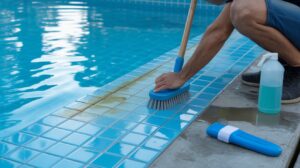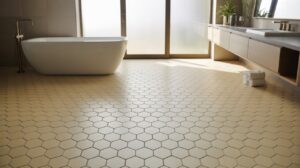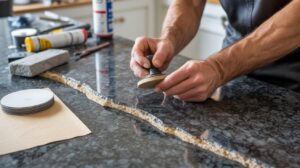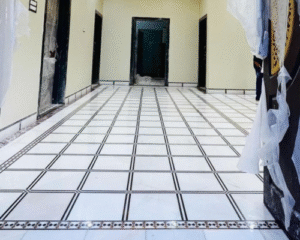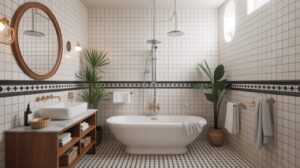Are marble floors slippery? This is a question many homeowners ask when considering marble for their home. Known for its timeless beauty and elegance, marble flooring adds luxury and value to any space. At SF Marble and Granite Inc., we have seen why people love marble its natural patterns, durability, and ability to enhance interiors like no other material. However, the concern about slipperiness is understandable, especially in areas like bathrooms, kitchens, and entryways. In this article, we’ll address whether marble floors are truly slippery and how you can maintain both safety and style in your home.
What Makes Marble Floors Slippery?
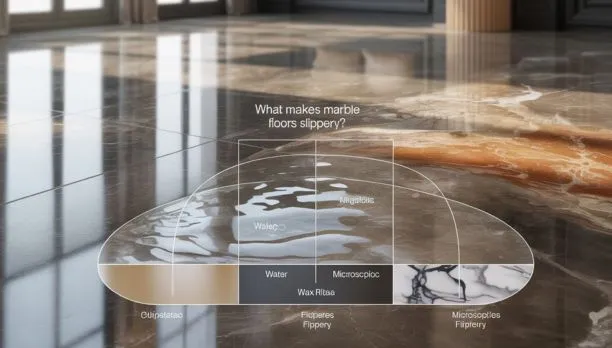
Many homeowners often wonder, Are marble floors slippery, especially after installing them in areas like bathrooms or kitchens. The truth is that marble has natural characteristics that can sometimes make it less slip-resistant. At SF Marble and Granite, we help our customers understand these factors before choosing marble flooring for their homes.
Table of Contents
ToggleNatural Smoothness and Polished Finish
Marble is a naturally smooth stone, and when it’s polished, it becomes even more reflective and glossy. This polished finish can reduce traction, especially when it’s wet. If you have marble in bathroom floor areas, the combination of water and a glossy surface can create a slippery condition.
Moisture, Cleaning Products, and Dust
- Water or spills can make the surface more slippery, especially on a bathroom marble tile floor.
- Certain cleaning products leave behind residue, which reduces friction.
- Even fine dust can act like a barrier between your feet and the floor, increasing the chance of slipping.
Foot Traffic and Footwear
High foot traffic areas wear down the natural texture of marble, making it smoother over time. The type of footwear also matters; socks or soft-soled shoes have less grip on polished marble than shoes with rubber soles.
By understanding these factors, homeowners can take steps to make marble floors safer while still enjoying their beauty and elegance.
Comparing Marble to Other Flooring Materials
Many homeowners ask whether marble floors are slippery compared to other common flooring materials, such as tile, granite, or vinyl. While marble is undeniably elegant, its polished finish can sometimes be more slippery than other options, especially in moisture-prone areas.
Marble vs. Tile, Granite, and Vinyl
- Tile: Standard ceramic or porcelain tiles often have a textured surface, making them less slippery when wet compared to a polished marble tile floor bathroom.
- Granite: Granite is generally harder and can have a slightly rougher finish, offering more traction.
- Vinyl: Vinyl floors usually have a softer, slip-resistant texture, making them a safer option in spaces where water is present.
Honed vs. Polished Marble: Which Is Safer?
When it comes to honed vs polished finishes, honed marble has a matte texture that naturally provides better grip. On the other hand, a polished marble floor has a glossy, reflective surface that can become slick when exposed to water or cleaning products. If safety is a concern, especially in bathrooms or kitchens, honed marble may be a better choice.
By carefully choosing the right finish and understanding how marble compares to other flooring materials, you can enjoy the beauty of marble without compromising safety.
How Moisture and Spills Impact Marble Floor Safety
One of the most common concerns homeowners have is are marble floors slippery when exposed to water or spills. Moisture is the biggest factor that affects the safety of marble flooring, especially in high-risk areas like bathrooms, kitchens, and pool surroundings.
High-Risk Zones for Slippery Surfaces
Spaces with frequent water exposure, such as bathrooms with hexagon tile in the bath, kitchens where spills are common, or poolside areas, require special attention. A polished marble surface in these spaces can quickly become slick, increasing the risk of accidents.
Marble and Water Absorption
Although marble is a natural stone, it absorbs water slowly, which means moisture often sits on the surface before it evaporates. This creates a temporary slippery film. Even after a professional marble floor installation, it’s essential to wipe away spills immediately to prevent slips.
Solutions for Safer Marble Floors
- Use non-slip marble floor tiles in bathrooms or other wet areas.
- Add rugs or mats near sinks and showers.
- Pair marble floors with design elements like green countertops for style without compromising safety.
Understanding how moisture affects marble allows homeowners to make informed choices and maintain both safety and beauty in their living spaces.
How to Make Marble Floors Less Slippery
Homeowners often ask, Are marble floors slippery, and if so, what can be done to reduce the risk? Fortunately, there are several effective solutions to make marble flooring safer without losing its luxurious appeal.
Sealing vs. Anti-Slip Coatings
Applying a quality sealant protects marble from stains but doesn’t always improve traction. For areas prone to moisture, anti-slip coatings are a better option as they create a slightly textured layer that helps prevent slips. This is especially useful in bathrooms, kitchens, or near granite countertops near me where spills are frequent.
Rugs, Mats, and Footwear
Placing rugs or mats in high-traffic areas can add an extra layer of safety. Soft rugs near sinks and entrances not only protect the marble but also reduce slipperiness. Wearing footwear with good grip can further minimize the risk of slipping, especially on polished marble floors.
Professional Polishing for Better Traction
A professional polishing service can adjust the finish of your marble floor to improve grip. Opting for a honed or matte finish during polishing provides more traction than a highly polished surface.By combining these solutions, you can keep your marble floors looking stunning while ensuring they are much safer for your household.
Maintenance Tips to Prevent Slippery Surfaces
A common question homeowners ask is, are marble floors slippery, and can proper maintenance help reduce the risk? The answer is yes, regular cleaning and using the right products can make a big difference in keeping your marble floors safe.
Daily Cleaning Habits
Dust and dirt can act like tiny ball bearings on marble surfaces, increasing the risk of slipping. Sweeping or vacuuming your floors daily prevents this buildup. After a marble floor installation, it’s important to establish a routine that includes wiping up spills immediately, especially in bathrooms and kitchens. This not only prevents slipperiness but also protects the stone’s finish.
Using the Right Cleaning Products
Avoid using harsh chemical cleaners or wax-based products, as they can leave behind a slick residue. Instead, use pH-balanced cleaners specifically designed for marble. These products clean effectively without compromising traction. For extra safety, consider applying an anti-slip treatment once or twice a year, particularly in areas with heavy foot traffic.
Final Thought
So, are marble floors slippery? The answer is that they can be, particularly in wet or high-traffic areas. But with the right finish, routine cleaning, and safety measures like rugs or anti-slip coatings, you can enjoy the luxury of marble without compromising on safety. At SF Marble and Granite, we provide professional marble floor installation and expert guidance to help homeowners keep their floors both stunning and secure.
If you’re ready to upgrade your home with elegant marble flooring, contact SF Marble and Granite today. Our team will help you choose the best finishes, offer maintenance tips, and deliver flawless installation for a safe and beautiful space that lasts for years.
FAQs
Are marble floors slippery when dry?
Marble floors are naturally smooth, but they are generally safe when dry. Slipperiness becomes a concern when water, dust, or cleaning residues accumulate on the surface. Regular cleaning and using non-slip rugs can help maintain traction.
How can I make marble floors less slippery?
To reduce slipperiness, consider applying anti-slip coatings, using rugs or mats in high-traffic areas, and cleaning with pH-balanced products. Professional services like marble floor installation experts at SF Marble and Granite can also recommend honed finishes that provide more grip than polished marble.
Are marble floors slippery in bathrooms and kitchens?
Yes, bathrooms and kitchens are high-risk areas because of constant exposure to water and spills. Installing non-slip treatments or opting for a honed finish is highly recommended in these spaces.

